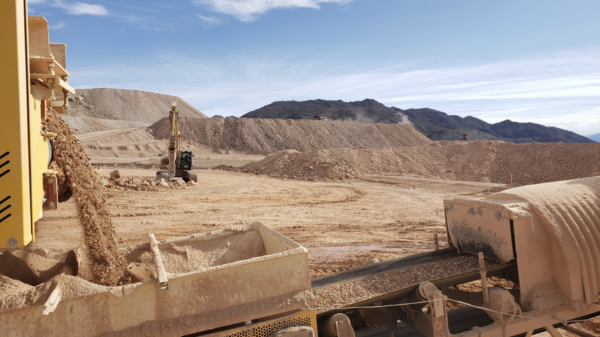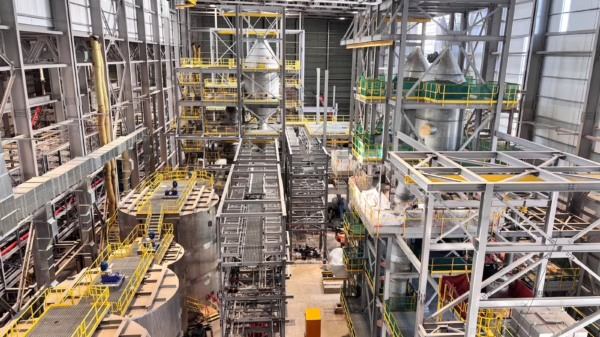Perpetua Resources Corp (TSE: PPTA) (NASDAQ: PPTA) submitted its formal application for a $2 billion debt financing with the Export-Import Bank of the United States (EXIM) to start building its Stibnite Gold Project.
When EXIM receives the application, it’s expected to perform its standard due diligence and review the project’s eligibility. The company said on Friday that its application follows engagement with EXIM’s underwriting team and receipt of the final federal permit for the project.
In April 2024, EXIM extended a non-binding Letter of Interest (LOI) to Perpetua for up to USD$1.8 billion in potential debt financing under its “Make More in America” initiative and “China and Transformational Exports Program.”
Following this, Perpetua increased its application amount to USD$2 billion. This adjustment reflects a higher estimated number of job-years based on financial updates and basic engineering completed in early 2025.
The company submitted the revised application shortly after a new Executive Order expanded government financing for domestic mineral production.
“The Stibnite Gold Project is poised to be a national strategic asset for domestic antimony production and is also a world class gold asset. EXIM financing could play a pivotal role in advancing the Project to production so we can reestablish a secure supply of antimony for the United States for decades to come,” said Jon Cherry, President and CEO of Perpetua Resources.
If approved, EXIM’s debt financing could cover most of the project’s development costs and strengthen U.S. competition with China.
Read more: NevGold closes its Nutmeg Mountain acquisition with Goldmining for $3 million
Read more: NevGold’s long intervals of antimony & gold mineralization turn heads
Stibnite Gold Project first acceptance into FAST process
In 2024, China blocked global exports of antimony, cutting off the U.S. and other countries from this critical mineral. Antimony plays a vital role in national defense. The Stibnite Gold Project offers a near-term solution by restoring U.S. antimony production. Additionally, it will produce gold and support environmental restoration in the historic Stibnite Mining District.
Earlier this month, Perpetua received its final federal permit—the Clean Water Act Section 404 permit—from the U.S. Army Corps of Engineers. This milestone marks the end of an eight-year federal interagency permitting process.
With the Army Corps permit secured—along with prior approvals from the U.S Forest Service and Idaho state agencies—Perpetua is now focused on obtaining its last few state permits.
The Stibnite Mine stands as a strategic example of how the FAST-41 permitting process—implemented under the Trump administration—can advance critical mineral projects vital to national security and economic resilience.
FAST-41, or the Fixing America’s Surface Transportation Act, aimed to streamline federal environmental reviews for large infrastructure projects, including mining.
Perpetua Resources’ Stibnite Gold Project became the first mining project accepted into this process, significantly improving coordination among federal agencies. As a result, Perpetua received its final federal permit in early 2025 after eight years of interagency review, demonstrating how FAST-41 helps reduce bureaucratic delays.
The Stibnite Mine is especially important as it could reestablish domestic antimony production, a critical mineral used in defense technologies. In 2024, China halted antimony exports, exposing U.S. supply chain vulnerabilities.
By aligning with FAST-41, the Stibnite Project illustrates how permitting reform can accelerate responsible resource development and reduce American reliance on foreign-controlled critical minerals.
Read more: NevGold pulls critical mineral antimony from Limo Butte property in Nevada
Read more: NevGold uncovers high grade multi metallic mineralization in Idaho
NevGold positions itself as potential domestic supplier
The global race for critical minerals has intensified due to escalating geopolitical tensions and supply chain vulnerabilities. Antimony, a vital mineral for defense and technology, is predominantly controlled by China, Russia, and Tajikistan, which collectively produce about 90 per cent of the world’s supply. In 2024, China decided to restrict antimony exports to the U.S.
To address these challenges, the U.S. has implemented initiatives like the FAST-41 program to expedite permitting for critical mineral projects.
Ioneer Ltd (ASX: INR) (NASDAQ: IONR) are developing the Rhyolite Ridge lithium-boron project in Nevada. Meanwhile, MP Materials Corp. (NYSE: MP), operates the Mountain Pass rare earth mine in California. Both are participants in this program, aiming to bolster domestic mineral production.
Beyond these, other companies are actively pursuing critical mineral projects. NevGold Corp (CVE: NAU) (OTCMKTS: NAUFF) (FRA: 5E50) has reported significant antimony and gold findings at its Limousine Butte Project in Nevada, positioning itself as a potential domestic supplier of antimony. Additionally, Rio Tinto Group (NYSE: RIO) has expanded its lithium ventures in Chile, securing a stake in the Altoandinos project.
.
NevGold Corp is a sponsor of Mugglehead news coverage
.













